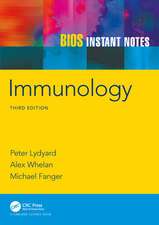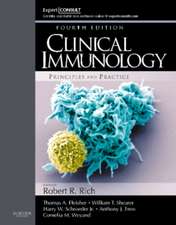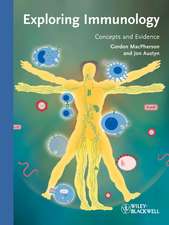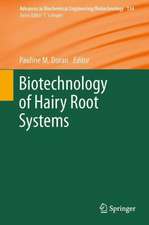Bispecific Antibodies
Editat de Roland E. Kontermannen Limba Engleză Paperback – 13 dec 2014
In this book, the different ways of generating bispecific antibodies are described, with emphasis on recombinant formats. The various applications of bispecific antibodies, e.g. in cellular cancer immunotherapy, radioimmunotherapy and pretargeting strategies are covered, and emerging applications such as dual targeting strategies, which involve the simultaneous inhibition of two targets, are addressed.
| Toate formatele și edițiile | Preț | Express |
|---|---|---|
| Paperback (1) | 1415.01 lei 43-57 zile | |
| Springer Berlin, Heidelberg – 13 dec 2014 | 1415.01 lei 43-57 zile | |
| Hardback (1) | 1420.29 lei 43-57 zile | |
| Springer Berlin, Heidelberg – 21 iul 2011 | 1420.29 lei 43-57 zile |
Preț: 1415.01 lei
Preț vechi: 1489.49 lei
-5% Nou
Puncte Express: 2123
Preț estimativ în valută:
270.77€ • 283.41$ • 225.36£
270.77€ • 283.41$ • 225.36£
Carte tipărită la comandă
Livrare economică 31 martie-14 aprilie
Preluare comenzi: 021 569.72.76
Specificații
ISBN-13: 9783642432071
ISBN-10: 3642432077
Pagini: 392
Ilustrații: XVII, 373 p.
Dimensiuni: 155 x 235 x 21 mm
Greutate: 0.55 kg
Ediția:2011
Editura: Springer Berlin, Heidelberg
Colecția Springer
Locul publicării:Berlin, Heidelberg, Germany
ISBN-10: 3642432077
Pagini: 392
Ilustrații: XVII, 373 p.
Dimensiuni: 155 x 235 x 21 mm
Greutate: 0.55 kg
Ediția:2011
Editura: Springer Berlin, Heidelberg
Colecția Springer
Locul publicării:Berlin, Heidelberg, Germany
Public țintă
ResearchCuprins
Janice M. Reichert: Foreword.- Roland Kontermann: Bispecific antibodies: developments and current perspectives.- Gerd Moldenhauer: Bispecific antibodies from hybrid hybridoma.- Diego Ellerman & Justin Scheer: Generation of bispecific antibodies by chemical conjugation.- Christoph Stein, Ingo Schubert & Georg Fey: Trivalent and trispecific antibody derivatives for cancer therapy.- Dafne Müller & Roland Kontermann: Diabodies, single-chain diabodies and their derivatives.- Patrick Chames & Daniel Baty: Bispecific single domain antibodies.- John Löfblom & Fredrik Y. Frejd: Alternative scaffolds as bispecific antibody mimetics.- Nico Mertens: Tribodies: building trispecificity by Fab-scFv fusions.- Pei Jin & Zhenping Zhu: The design and engineering of IgG-like bispecific antibodies.- Edit Tarcsa, Wolfgang Fraunhofer, Tariq Ghayur, Jochen Salfeld & Jijie Gu: Dual-variable-domain immunoglobulin (DVD-IgTM) technology: a versatile, novel format for the next generation of dual-targeting biologics.- Patrick Koenig & Germaine Fuh: Two-in-one antibodies.- Chien-Hsing Chang, Edmund A. Rossi, Robert Sharkey & David M. Goldenberg: The Dock-and-Lock (DNL) approach to novel bispecifc antibodies.- Christian Kellner, Matthias Peipp & Thomas Valerius: Effector cell recruitment by bispecific antibodies.- Lawrence Lum & Archana Thakur: Bispecific anibodies for arming activated T cells and other effector cells for tumor therapy.- Patrick Baeuerle, Gerhard Zugmaier & Dominik Rüttinger: Bispecific T cell engager for cancer therapy.- Horst Lindhofer, Jürgen Hess & Peter Ruf: Trifunctional Triomab® antibodies for cancer therapy.- Bruno Robert, Christel Larbouret, David Azria, Jean-Pierre Mach & André Pèlegrin: Bispecific antibodies for the retargeting of cytokines.- Dirk Nettelbeck: Bispecific antibodies and gene therapy.- Archana Parashar, Susmita Sarkar, Advaita Ganguly, Saikiran Sharma & Mavanur R.Suresh: Bispecific antibodies for diagnostic applications.
Textul de pe ultima copertă
The concept of using bispecific antibodies for cancer therapy by retargeting immune effector cells was developed more than 25 years ago. However, initial clinical studies were rather disappointing mainly due to low efficacy, severe side effects and the immunogenicity of the bispecific antibodies. A deeper understanding of effector cell biology and especially developments in the field of antibody engineering has led to the generation of new classes of bispecific antibodies capable of circumventing many of these obstacles. Furthermore, new applications were established for bispecific antibodies, such as pre-targeting strategies in radioimmunotherapy and dual targeting approaches in order to improve binding, selectivity and efficacy.
In this book, the different means of generating bispecific antibodies are described, with an emphasis on recombinant formats, and information on the various applications of bispecific antibodies, e.g. in cellular cancer immunotherapy, radioimmunotherapy and pretargeting strategies, but also on emerging applications such as dual targeting strategies, i.e., the simultaneous inhibition of two targets (cytokines, receptors, etc.) are provided. This book is intended for a broad readership in the field of antibody engineering, mainly from the pharmaceutical and biotechnology sector, but also including academic researchers working in this field.
In this book, the different means of generating bispecific antibodies are described, with an emphasis on recombinant formats, and information on the various applications of bispecific antibodies, e.g. in cellular cancer immunotherapy, radioimmunotherapy and pretargeting strategies, but also on emerging applications such as dual targeting strategies, i.e., the simultaneous inhibition of two targets (cytokines, receptors, etc.) are provided. This book is intended for a broad readership in the field of antibody engineering, mainly from the pharmaceutical and biotechnology sector, but also including academic researchers working in this field.
Caracteristici
Presents the recent advances in antibody engineering and in the various clinical applications An invaluable resource for both experts and those new to the field With contributions by international experts from research and biotech companies Includes supplementary material: sn.pub/extras









